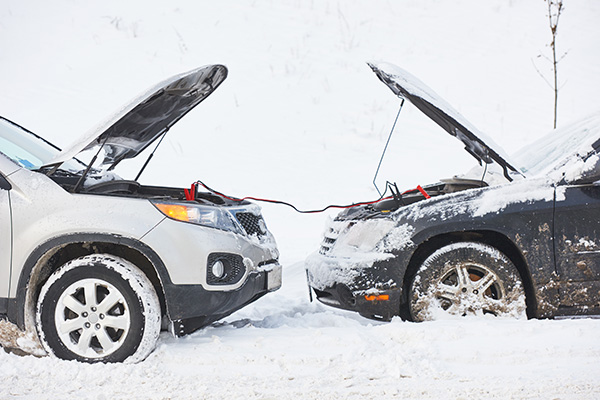
Cold weather can be tough on vehicles. If your car struggles to start in the morning when temperatures drop, you're not alone. Freezing temperatures affect battery strength, oil thickness, fuel delivery, and several other systems that all need to work together for a successful startup. Understanding what's going wrong can help you avoid getting stranded and know when it's time to bring your car in for service.
Cold Starts and Battery Trouble
Your battery loses power in cold weather. At 32°F, it can lose about 20 percent of its strength. By the time it drops to 0°F, it's operating at around half capacity. Meanwhile, your engine needs more power to turn over because oil thickens in the cold. If the battery is more than three or four years old, or if you hear slow cranking before the engine starts, it may not have enough juice left for winter mornings.
A weak battery might still work in mild weather but struggle when it’s cold. Look out for dim dashboard lights, repeated clicking when you turn the key, or a complete lack of response. These are all signs that the battery should be tested or replaced.
Thick Oil Makes the Engine Harder to Turn
Engine oil thickens when temperatures drop, which makes it harder for the starter to turn the engine over. The oil pump has to work harder, and the engine may turn slower than usual before firing up. If your oil hasn’t been changed in a while or you're using an oil that’s too thick for winter conditions, that can make cold starts more difficult.
Many modern vehicles use synthetic oil, which flows better in the cold. If yours still uses conventional oil, switching to a winter-grade synthetic can help reduce strain during those early morning starts.
Fuel System Issues in Freezing Conditions
Water vapor in the fuel system can freeze, especially if the tank is low. Ice crystals can block fuel lines or filters, causing the engine to sputter or fail to start at all. Keeping your fuel tank at least half full during winter can reduce the risk of moisture buildup. In older vehicles, using a fuel additive designed to remove water may help if this problem shows up repeatedly.
Diesel engines are especially prone to cold-start problems. Diesel fuel can gel at low temperatures, which restricts flow through the system. Winter-blended diesel or fuel additives are often necessary to prevent this in very cold regions.
Ignition and Sensor Problems Can Get Worse in the Cold
When temperatures fall, small problems with spark plugs, ignition coils, or crankshaft sensors often become more noticeable. You might get a strong fuel smell without startup, or the engine may crank but never catch. Moisture on sensor connections or failing ignition components can become more sensitive as they contract in the cold.
If your car only has trouble starting on cold mornings but runs fine afterward, it’s worth checking ignition components before blaming the battery or fuel system.
Don’t Ignore Repeated Cold Start Failures
If your car has trouble starting once, that might be due to a particularly cold morning. But if it becomes a pattern, something needs attention. The longer you wait, the more likely you are to end up with a no-start situation in a place you don’t want to be. Cold weather tends to expose weak points, and it’s best to deal with them before they leave you stranded.
Cold Weather Starting Help at Complete Automotive Repair Specialists in Cromwell, CT
If your car struggles to start on cold mornings, the team at Complete Automotive Repair Specialists can help. We’ll test the battery, inspect the ignition system, and make sure your fuel and oil are winter-ready.
Schedule your visit today and get peace of mind before the next cold snap hits.